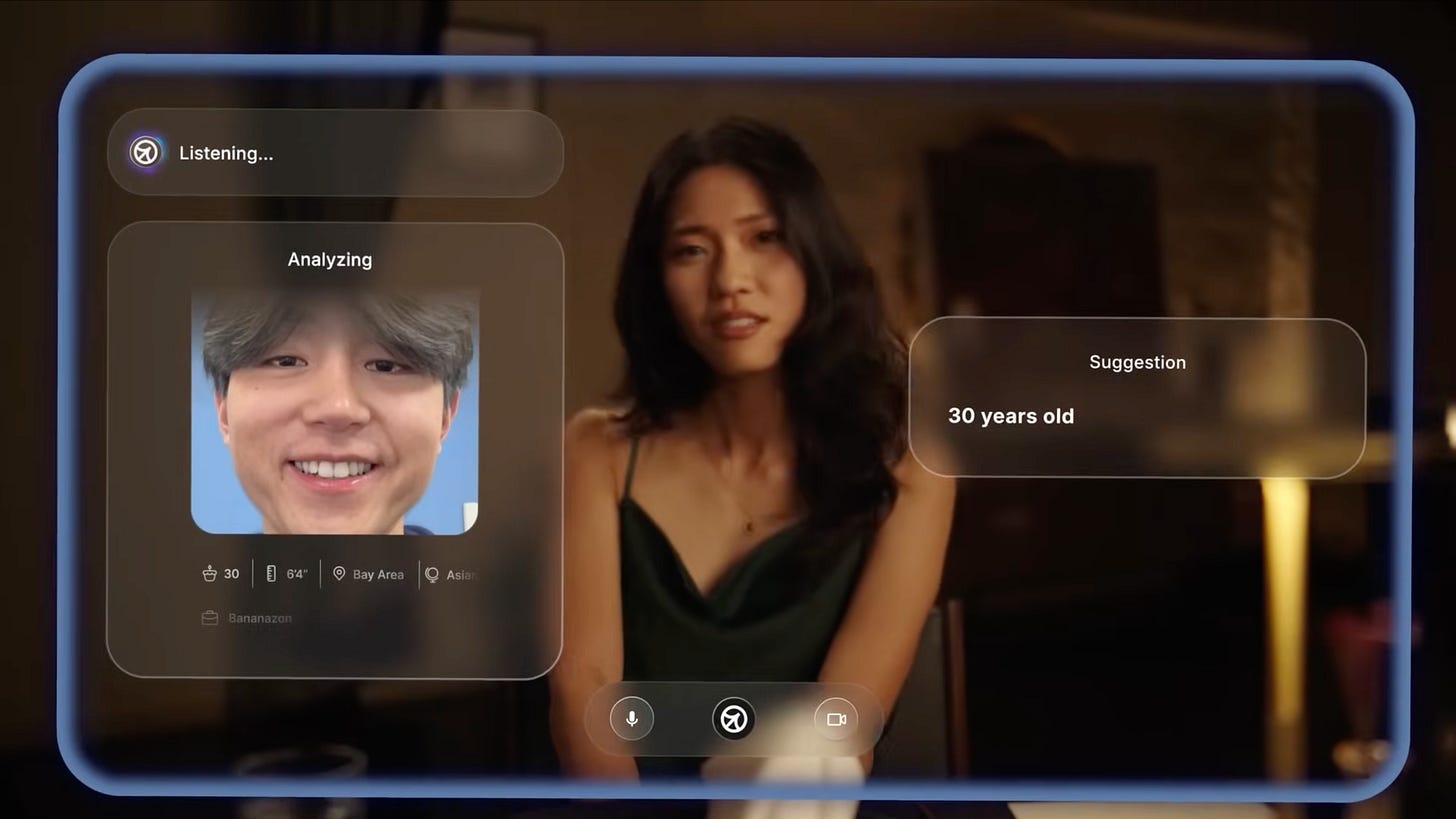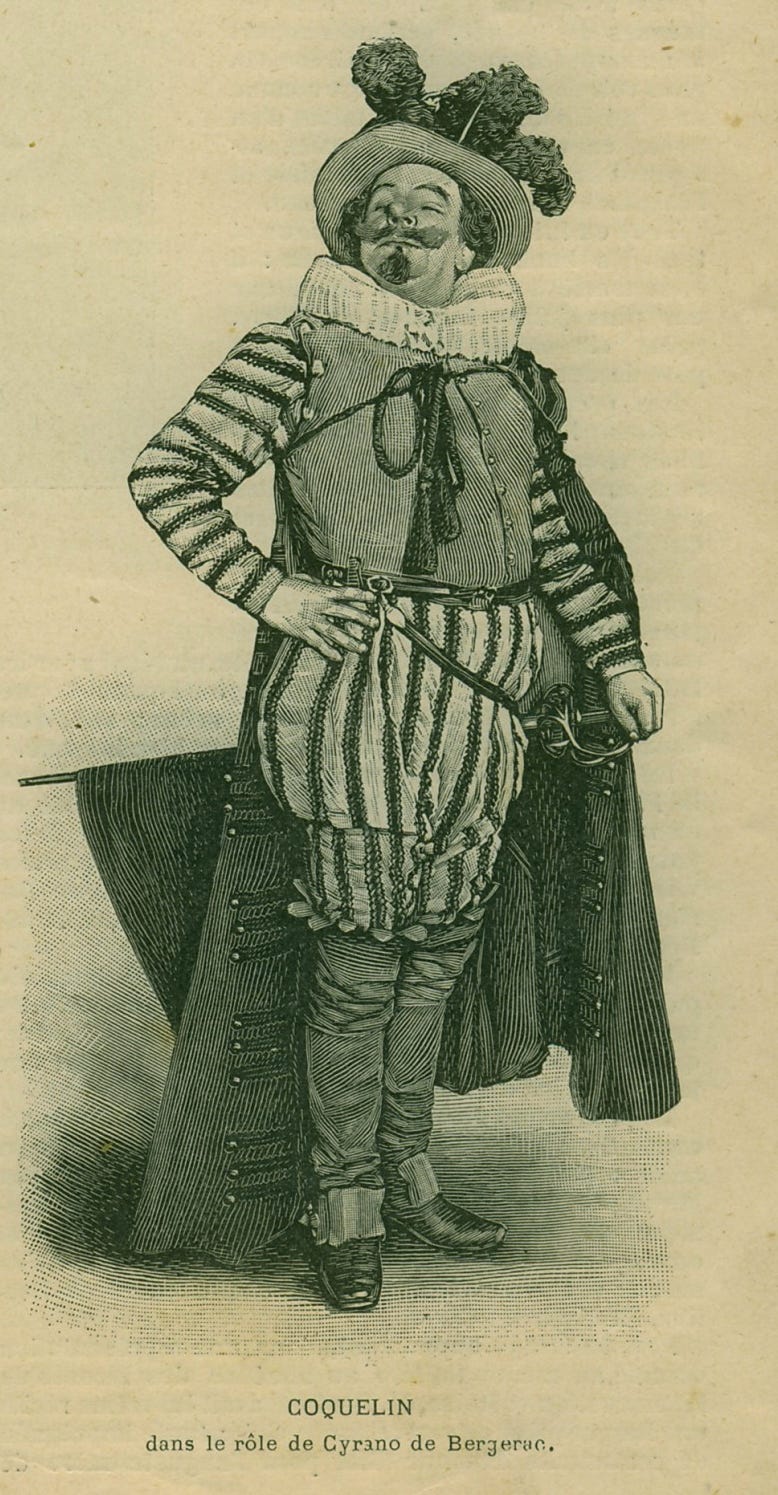Jason Jason | July 22, 2025
The Cyranoid Edition
On Cluely, Milgram, and being told what to say.
Recommended Products

A book by Jason that explores the literary scene during the Great Depression and draws parallels with today's culture.
An engaging exploration of Montaigne's life and philosophy, offering thoughtful insights on how to live.
Jason is the editorial lead at Fable, the social app for readers. He is also the author of The Deep End: The Literary Scene in the Great Depression and Today and contributor of The Euchre Edition and The Heteronym Edition for WITI.

Jason here. More than 40 years ago, a woman answered a newspaper ad to participate in a psychology study. Then, instead of a personality quiz or ink blot interpretation, she was asked to interview a 16-year-old boy and share her impressions. During the session, their long conversation became strangely intimate, and the woman ended up confessing her marital woes to this complete stranger. “He was very likable,” she recalled, describing how they bonded. “He showed a great deal of maturity. I think he was very sincere.” Once the woman had delivered her feedback, the distressing truth was revealed: the teenager had simply been reciting lines fed to him through a radio transmitter in his ear, all his responses scripted by Stanley Milgram, the controversial social psychologist who showed how ordinary people could turn into torturers during his 1961 Obedience to Authority study.
Milgram called these shadow actors “cyranoids,” meant to test how we perceive our fellow human beings. “They are only relaying speech word-for-word that is beamed to them from a distal source,” Milgram explained in an essay about the experiment. “Every word spoken by the cyranoid is unoriginal.” The term came from Cyrano de Bergerac, the 19th century comedy in verse about a playwright named Cyrano (based on a real-life writer from the 17th Century) who ghost-wrote love letters for his friend Christian. In the play’s most iconic scene, Cyrano hides in the bushes and whispers romantic lines for Christian to use as he attempts to woo the beautiful Roxane. “I believe the technique has many interesting applications,” Milgram concluded in his notebooks, recognizing how easily the cyranoid illusion can fool us. “A 15-year-old dropout suddenly acquires a mature scientific mode of speech. A shy person suddenly interacts with a beautiful girl, with a knowing and sophisticated line.”
Why is this interesting?
21-year-old Roy Lee turned himself into a digital cyranoid earlier this year, receiving his thoughts from an AI model rather than a social psychologist. Lee designed an app that fed him live answers to coding questions during virtual job interviews, and then posted a video of the tool working during a real job interview. Facing disciplinary action, he dropped out of Columbia and has since raised $15 million in funding for an app called Cluely that will mass produce cyranoids. Just like Milgram helped that teenager in the experiment, Lee’s app listens to a conversation and delivers the ideal script for any meeting, sales call, or virtual interview. “Cluely hears the conversation and gives you live, context-aware responses to questions, and recalls information from earlier in the transcript so you never lose the thread,” the website assures us.
To bring the cyranoid comparison full circle, the pitch video for this new company shows Lee getting fed conversation lines through an imaginary interface during a date, just like Cyrano de Bergerac’s hapless friend Christian. “We want to cheat on everything. Yep, you heard that right. Interviews. Exams. Sales calls. Meetings. If there's a faster way to win — we'll take it,” the video copy reads, with that same sense of dystopian marketing that made Milgram’s Obedience to Authority so memorable.
At some point in the last year or so, we stumbled across a threshold. Sam Altman brags that college kids use ChatGPT “as an operating system” for everyday life, handing in AI work for math quizzes, personal essays, and research papers. The cyranoid is no longer a theoretical construct. For the next few years, every single email, legal contract, essay, Zoom call, job interview, or text will be an exercise in cyranoid detection. “When every single person is using AI to cheat on meetings, then it's not that you're cheating anymore. This is just how humans will operate and think in the future,” Cluely founder Lee said in a video feature, describing both his business model and how a generation of cyranoids could alter human consciousness.
Milgram made plenty of headlines with his bombastic research, but also faced criticism for his problematic ethics and wiggly statistics. So when the professor conceived his cyranoid research in the early 1980s, he struggled to find funding. “Milgram is here the clever kid who has been given a clever hammer and now needs something that needs pounding,” reads one rejection letter quoted in his biography. Milgram died in December 1984, at just 51-years-old, never finding a way to study his wild idea at scale. We could use Milgram’s clever hammer these days. I wish we had decades of research we could turn to as the world fills with cyranoids.
Roy Lee thinks everything is going to turn out just fine: “In reality, if we do have a superintelligence and AI that can do everything that a human can do but better, this will inevitably result in faster scientific progress. Cancer is no longer a thing. Alzheimer's is no longer a thing. You and I don't die at 80 years old, we die at 800-years-old, and our lives are infinitely expanded,” he said in one video interview. “In this world, you won't be just some mindless puppet. You will be doing what you natively want to do.”
I kept rewinding that section of the video, watching his eyes rove around the room. I felt like a character in a 1970s conspiracy thriller, trying to decode the meaning of a cryptic film reel. Was I watching the earnest musings of a college kid? Or was he reciting a recruitment speech from our robot overlords that blended a Bill Hicks monologue and a TED Talk? I thought about that poor woman in Milgram’s experiment, recording her impressions of a cyranoid teenager with a phrase that will soon be impossible to say with any degree of certainty: “I think he was very sincere.” (JB)
Quick links:
19th Century Actor of the Day: Constant Coquelin first played the role of Cyrano de Bergerac in 1897, and would perform it more than 410 times as the hit play toured the world.
Michel de Montaigne is the immortal French writer who retired to his tower in 1571 to let his thoughts “run free and ramble,” inventing the essay and inspiring everybody from William Shakespeare to Virginia Woolf. Reading his work at HyperEssay is a great cure for cyranoid-induced anxiety.
I never realized how inspiring Montaigne’s writing could be until I read Sarah Bakewell’s book, “How to Live: Or A Life of Montaigne in One Question and Twenty Attempts at an Answer.”
Thanks to the amazing Los Angeles Public Library, my wife and I have been digging through the deep foreign film selection at Kanopy. If your library system has a subscription, you need to try it.
